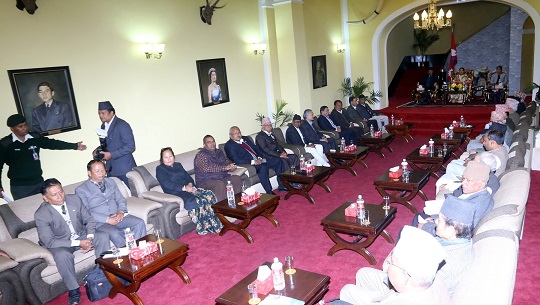Shaky political commitments behind deferred development
 Narayan Prasad Ghimire / Kathmandu: Recently, the Prime Minister directed the ministers and secretaries to increase the capital expenditure to 80 percent. Expressing dissatisfaction over the negligible capital expenditure in the recent quarter of the fiscal year, he issued such directive during a meeting of the development problems resolution committee of the National Planning Commission.
Narayan Prasad Ghimire / Kathmandu: Recently, the Prime Minister directed the ministers and secretaries to increase the capital expenditure to 80 percent. Expressing dissatisfaction over the negligible capital expenditure in the recent quarter of the fiscal year, he issued such directive during a meeting of the development problems resolution committee of the National Planning Commission.
Such directions are, however, normal, as they are made in many meetings, to many bureaucrats and departments as usual. To remind one here, when Baburam Bhattarai was Prime Minister, he, in the same meeting of the National Planning Commission as the Chairman, had exclaimed what the baloney it was that the glossy paper reports on development projects showed progress in Karnali region, but the lives of the Karnali people was never changed.
On the one hand, Karnali region is still reeling under the poverty and paucity, it has been a mighty tag and a tool for some to ensure deep pocket as Baburam’s observation of glossy paper report suggests.
However, commitment of our political parties and leaders for development is questionable. Those voicing for the development and economic prosperity during the reign are so emasculated after the change of government that they hardly talk, debate, discuss and strive for development. Interestingly, they assure the voters of development of infrastructures before every election, but only to guarantee their steps towards political ladder and leadership. They even do not conduct monitoring and follow up of the development initiatives their governments take.
Not only Karnali region but many parts of the country are plagued with paucity and poverty. A news report the other day read – a woman killed her two children and herself in the southern plains of the country owing to poverty. It is noted that poverty alleviation has been a continuous focus of Nepal’s periodic plan since the fifth plan way back in the 70s.
As the political parties are the major drivers of the national affairs, they have direct responsibility to propel the national politics and economy. When the politics – that too the petty party politics – shadows economic affairs, the development discourse is obviously put in the backburner. To this, one of the most ludicrous debate Nepali political parties have not left fuelling for long is on nationality/nationalism. When the political parties find their roles subsided, the nationality/nationalism debate is flared up. It shows the development discourse is yet to develop among our political parties.
Moreover, so far, Nepali political struggles have not been linked to economic prosperity and development. Despite several political struggles made for the freedom and rights, they have failed to link with development endeavours. The struggles and movements have resulted in change of system- the 2007 BS movement brought democracy; the 1990 people’s movement restored democracy; and 2006 people’s movement brought loktantra and abolished monarchy. Still, the voices for rights are rife.
Despite this, we cannot negate that all governments failed on initiating development projects. The development initiatives taken by government as early as the one led by BP Koirala were quite far-sighted. The construction of postal highway and mid-hill highway are not new projects. But, the royal coup of 1960 frustrated every development effort taken by leader BP Koirala. The sabotage of development continued till the restoration of democracy in 1990. The ditched development projects – mid-hill highway and postal highway are yet to be accomplished as of today.
Many are showing jubilation over the upcoming Dashain gift, as the government has claimed, – the Melamchi water in the Kathmandu Valley. How do they respond to when they know that this project bears a bitter reality- it is an example of deferred and deserted development. It was the saintly leader Krishna Prasad Bhattarai to announce the ambitious Melamchi project in 1991, but it is getting materialized in 2017!
These examples are enough to prove that both party-less Panchayat system and the governments after 1990 are culpable for deferring and ditching development. The ministers and senior bureaucrats tainted with huge corruptions must have link somewhere with deferral of development. Also, the Maoist insurgency cannot be forgotten for it derailed not only democracy but also the development. In the recent years, the emergence of militant trade unionism being affiliated to various political parties have not only stifled bureaucratic affairs and clog-jammed public service delivery, but also hindered development activities.
Amid such, is it the conclusion that Nepal is in development deadlock? Has it not the guts to unlock development potential?
Various governments have forwarded the mega projects as of national pride projects and construction of cities along the mid-hill highway. In order to accomplish these on time and bring positive change in people’s lives, the political willpower and cooperation among all political parties is imperative. The blame game must come to an end at least for economic prosperity. Importantly, development cannot be a political tool, but a measure to bring change. For it to happen, why not first develop development discourse among political parties? RSS
